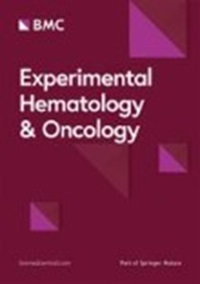抑制A-to-I RNA编辑酶ADAR1可通过调节Keap1/Nrf2通路使肝癌细胞对氧化应激敏感
IF 9.4
1区 医学
Q1 HEMATOLOGY
引用次数: 0
摘要
A 到 I RNA 编辑是肝细胞癌(HCC)中大量的转录后修饰事件。有证据表明,作用于 RNA 的腺苷脱氨酶 1(ADAR1)与作为 HCC 发病关键因素的氧化应激相关。本研究探讨了 ADAR1 对 HCC 存活和氧化应激的影响及其内在机制。本研究通过实时定量 PCR 和免疫组化技术检测了 50 例 HCC 和正常组织中 ADAR1 的表达。为了稳定敲除或过表达 ADAR1,将携带 sh-ADAR1 或 ADAR1 过表达的腺相关病毒载体转染到 HepG2 和 SMMC-7721 细胞中。将转染细胞暴露于氧化应激激动剂 tBHP 或索拉非尼拜 43-9006。对细胞增殖、凋亡和氧化应激进行了测定,并进行了肿瘤异种移植实验。ADAR1在HCC中上调,并与不利的临床结果相关。ADAR1 缺乏可抑制 HCC 细胞增殖和肿瘤生长,并增强细胞凋亡。此外,ADAR1的缺失会促进细胞内ROS的积累,并升高Keap1和降低Nrf2的表达。在 ADAR1 缺失的情况下,细胞内 GSH 含量和 SOD 活性降低,MDA 含量增加。过表达 ADAR1 时则观察到相反的结果。同时抑制 ADAR1 会进一步加剧 tBHP 和 Bay 43-9006 对存活、凋亡、细胞内 ROS 积累和 Keap1/Nrf2 通路的影响。本研究揭示了ADAR1是HCC细胞存活和氧化应激所必需的,靶向ADAR1可通过调节Keap1/Nrf2通路使HCC细胞对氧化应激敏感。本文章由计算机程序翻译,如有差异,请以英文原文为准。
Suppression of A-to-I RNA-editing enzyme ADAR1 sensitizes hepatocellular carcinoma cells to oxidative stress through regulating Keap1/Nrf2 pathway
A-to-I RNA editing is an abundant post-transcriptional modification event in hepatocellular carcinoma (HCC). Evidence suggests that adenosine deaminases acting on RNA 1 (ADAR1) correlates to oxidative stress that is a crucial factor of HCC pathogenesis. The present study investigated the effect of ADAR1 on survival and oxidative stress of HCC, and underlying mechanisms. ADAR1 expression was measured in fifty HCC and normal tissues via real-time quantitative PCR, and immunohistochemistry. For stable knockdown or overexpression of ADAR1, adeno-associated virus vectors carrying sh-ADAR1 or ADAR1 overexpression were transfected into HepG2 and SMMC-7721 cells. Transfected cells were exposed to oxidative stress agonist tBHP or sorafenib Bay 43-9006. Cell proliferation, apoptosis, and oxidative stress were measured, and tumor xenograft experiment was implemented. ADAR1 was up-regulated in HCC and correlated to unfavorable clinical outcomes. ADAR1 deficiency attenuated proliferation of HCC cells and tumor growth and enhanced apoptosis. Moreover, its loss facilitated intracellular ROS accumulation, and elevated Keap1 and lowered Nrf2 expression. Intracellular GSH content and SOD activity were decreased and MDA content was increased in the absence of ADAR1. The opposite results were observed when ADAR1 was overexpressed. The effects of tBHP and Bay 43–9006 on survival, apoptosis, intracellular ROS accumulation, and Keap1/Nrf2 pathway were further exacerbated by simultaneous inhibition of ADAR1. The current study unveils that ADAR1 is required for survival and oxidative stress of HCC cells, and targeting ADAR1 may sensitize HCC cells to oxidative stress via modulating Keap1/Nrf2 pathway.
求助全文
通过发布文献求助,成功后即可免费获取论文全文。
去求助
来源期刊

Experimental Hematology & Oncology
Medicine-Oncology
CiteScore
12.60
自引率
7.30%
发文量
97
审稿时长
6 weeks
期刊介绍:
Experimental Hematology & Oncology is an open access journal that encompasses all aspects of hematology and oncology with an emphasis on preclinical, basic, patient-oriented and translational research. The journal acts as an international platform for sharing laboratory findings in these areas and makes a deliberate effort to publish clinical trials with 'negative' results and basic science studies with provocative findings.
Experimental Hematology & Oncology publishes original work, hypothesis, commentaries and timely reviews. With open access and rapid turnaround time from submission to publication, the journal strives to be a hub for disseminating new knowledge and discussing controversial topics for both basic scientists and busy clinicians in the closely related fields of hematology and oncology.
 求助内容:
求助内容: 应助结果提醒方式:
应助结果提醒方式:


